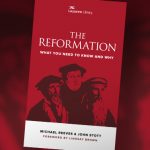The Lausanne Movement for Friday, 23 June 2017 "The Reformation in Your Pocket"





An Update from Julia Cameron
The Reformation in Your Pocket
 ‘I don’t know of a better brief introduction to the Reformation and its continuing importance today,’ says Vaughan Roberts, Lausanne plenary speaker and Rector of St Ebbe’s Church, Oxford. He is referring to Lausanne’s new book, The Reformation: What You Need to Know and Why.
‘I don’t know of a better brief introduction to the Reformation and its continuing importance today,’ says Vaughan Roberts, Lausanne plenary speaker and Rector of St Ebbe’s Church, Oxford. He is referring to Lausanne’s new book, The Reformation: What You Need to Know and Why.There are many books on the Reformation. Why add to them? This one is different, it’s pithy, and it’s all contained in 100 pages. I venture to say you will discover surprises.
The Reformation would change everything—culture, commerce, and learning. This is why it has entered people’s general knowledge, far beyond the reach of the church.
The church in medieval times had sunk very low. It was the Reformation martyrs who provided a way for us to receive the precious and eternal gospel intact. What courage the martyrs showed! Hundreds were burned at the stake, and many more died in prison. Then the truth of Christ finally shone through the darkness.
The Reformation did not really ‘begin’ in 1517, as we hear many say. The Englishman John Wycliffe, born nearly 200 years earlier, is known as its ‘Morning star’, and the first burning of a so-called ‘heretik’, for declaring the gospel, took place in Scotland in 1407.
With this context in mind, you might ask, ‘What will I get from this book?’
Michael Reeves gives us a fast-paced storyline of what happened in Europe; and this is accompanied by a timeline for easy reference. Then John Stott (in a previously unpublished piece) reflects on the part we must play in contending for apostolic truth in our own times.
You will also find the full text of Luther’s 95 Theses, plus an appendix by Alan Purser, looking at Jesus’ prayer for unity in John 17. This passage has been widely misunderstood, and often mis-preached. The book closes with questions for a study group or book club.
It is an unusual collection, which we don’t think you will find anywhere else. You can buy it in North America, as well as in the UK and globally. We commend it to you warmly.
Julia E M Cameron (MA, Aberdeen University) has led Communications and Publishing endeavours for OMF International, IFES, and the Third Lausanne Congress. She is an author and Editor, and has written for the UK broadsheets and the Oxford Dictionary of National Biography. Julia has served since 2011 as Director of Publishing and Senior Editor for the Lausanne Movement. She lives in Oxford.
The Reformation in Your Pocket by Julia Cameron
 ‘I don’t know of a better brief introduction to the Reformation and its continuing importance today,’ says Vaughan Roberts, Lausanne plenary speaker and Rector of St Ebbe’s Church, Oxford. He is referring to Lausanne’s new book, The Reformation: What You Need to Know and Why.
‘I don’t know of a better brief introduction to the Reformation and its continuing importance today,’ says Vaughan Roberts, Lausanne plenary speaker and Rector of St Ebbe’s Church, Oxford. He is referring to Lausanne’s new book, The Reformation: What You Need to Know and Why.There are many books on the Reformation. Why add to them? This one is different, it’s pithy, and it’s all contained in 100 pages. I venture to say you will discover surprises.
The Reformation would change everything—culture, commerce, and learning. This is why it has entered people’s general knowledge, far beyond the reach of the church.
The church in medieval times had sunk very low. It was the Reformation martyrs who provided a way for us to receive the precious and eternal gospel intact. What courage the martyrs showed! Hundreds were burned at the stake, and many more died in prison. Then the truth of Christ finally shone through the darkness.
The Reformation did not really ‘begin’ in 1517, as we hear many say. The Englishman John Wycliffe, born nearly 200 years earlier, is known as its ‘Morning star’, and the first burning of a so-called ‘heretik’, for declaring the gospel, took place in Scotland in 1407.
With this context in mind, you might ask, ‘What will I get from this book?’
Michael Reeves gives us a fast-paced storyline of what happened in Europe; and this is accompanied by a timeline for easy reference. Then John Stott (in a previously unpublished piece) reflects on the part we must play in contending for apostolic truth in our own times.
You will also find the full text of Luther’s 95 Theses, plus an appendix by Alan Purser, looking at Jesus’ prayer for unity in John 17. This passage has been widely misunderstood, and often mis-preached. The book closes with questions for a study group or book club.
It is an unusual collection, which we don’t think you will find anywhere else. You can buy it in North America, as well as in the UK and globally. We commend it to you warmly.

 Julia E M Cameron (MA, Aberdeen University) has led Communications and Publishing endeavours for OMF International, IFES, and the Third Lausanne Congress. She is an author and Editor, and has written for the UK broadsheets and the Oxford Dictionary of National Biography. Julia has served since 2011 as Director of Publishing and Senior Editor for the Lausanne Movement. She lives in Oxford.
Julia E M Cameron (MA, Aberdeen University) has led Communications and Publishing endeavours for OMF International, IFES, and the Third Lausanne Congress. She is an author and Editor, and has written for the UK broadsheets and the Oxford Dictionary of National Biography. Julia has served since 2011 as Director of Publishing and Senior Editor for the Lausanne Movement. She lives in Oxford.(Read more The Reformation in Your Pocket)
Recent Updates:
• The Reformation in Your Pocket - Julia Cameron
The Reformation in Your Pocket by Julia Cameron
 ‘I don’t know of a better brief introduction to the Reformation and its continuing importance today,’ says Vaughan Roberts, Lausanne plenary speaker and Rector of St Ebbe’s Church, Oxford. He is referring to Lausanne’s new book, The Reformation: What You Need to Know and Why.
‘I don’t know of a better brief introduction to the Reformation and its continuing importance today,’ says Vaughan Roberts, Lausanne plenary speaker and Rector of St Ebbe’s Church, Oxford. He is referring to Lausanne’s new book, The Reformation: What You Need to Know and Why.There are many books on the Reformation. Why add to them? This one is different, it’s pithy, and it’s all contained in 100 pages. I venture to say you will discover surprises.
The Reformation would change everything—culture, commerce, and learning. This is why it has entered people’s general knowledge, far beyond the reach of the church.
The church in medieval times had sunk very low. It was the Reformation martyrs who provided a way for us to receive the precious and eternal gospel intact. What courage the martyrs showed! Hundreds were burned at the stake, and many more died in prison. Then the truth of Christ finally shone through the darkness.
The Reformation did not really ‘begin’ in 1517, as we hear many say. The Englishman John Wycliffe, born nearly 200 years earlier, is known as its ‘Morning star’, and the first burning of a so-called ‘heretik’, for declaring the gospel, took place in Scotland in 1407.
With this context in mind, you might ask, ‘What will I get from this book?’
Michael Reeves gives us a fast-paced storyline of what happened in Europe; and this is accompanied by a timeline for easy reference. Then John Stott (in a previously unpublished piece) reflects on the part we must play in contending for apostolic truth in our own times.
You will also find the full text of Luther’s 95 Theses, plus an appendix by Alan Purser, looking at Jesus’ prayer for unity in John 17. This passage has been widely misunderstood, and often mis-preached. The book closes with questions for a study group or book club.
It is an unusual collection, which we don’t think you will find anywhere else. You can buy it in North America, as well as in the UK and globally. We commend it to you warmly.
Calling the Church to Affirm Wealth Creators by David Bennett

‘What is the role of wealth creation in holistic transformation?’ Have you ever heard a sermon or participated in a small group Bible study that answered this question? If your answer is ‘No’, you are not alone.
Although I have been preaching and teaching the Bible for over four decades, I had never addressed that question explicitly. I had taught about the dangers of obsession with wealth, and the importance of good stewardship of wealth. I had discussed the importance of ethical creation of wealth, and the compassionate sharing of wealth. I had advised foundations and wealthy individuals concerning the wise distribution of their wealth. But I had never taught about the God-given role of wealth creators. I had not highlighted the potential impact of a growing business, not only in lifting individuals out of poverty, but in benefiting entire communities, caring for creation, and introducing people to the good news of reconciliation and shalom through Jesus Christ.
Mats Tunehag, our first Lausanne Catalyst for Business as Mission (BAM), expresses it like this, in a chapter for a book soon to published by the Korean BAM movement:
The Bible talks about wealth in three ways; one is bad and two are good. Hoarding of wealth is condemned. Sharing of wealth is encouraged. But there is no wealth to be shared unless it has been created . . . All too often in the church the issue of wealth creation is misunderstood, neglected, or even rejected. The same thing applies to wealth creators.
A recent Lausanne Global Consultation, co-sponsored by the Lausanne Movement and BAM Global, aimed to address this concern. About 30 people from 20 countries representing every continent—the majority being leaders in business, but also from church, missions, and academia—gathered in Chiang Mai, Thailand, for four days in March 2017. We examined seven aspects of wealth creation for holistic transformation, including biblical and theological foundations, case studies of wealth creators, issues of poverty and justice, cultural factors, care for the environment, and the role of the local church. Over several months the sub-groups had developed advance papers, which were reviewed and discussed by the participants in Chiang Mai. The papers are being further refined based on this collective wisdom, and will be posted online soon. Later will come a book, and educational videos. You can learn about the vision for this consultation through Mats’ blog post.
The key points of the consultation were summarized in a Wealth Creation Manifesto, which I’m presenting to you today. Here are some of the key points of this new document:
Wealth creation is rooted in God the Creator, who created a world that flourishes with abundance and diversity . . . Wealth creators should be affirmed by the church, and equipped and deployed to serve in the marketplace among all peoples and nations . . . Wealth creation through business has proven power to lift people and nations out of poverty. Wealth creation must always be pursued with justice and a concern for the poor, and should be sensitive to each unique cultural context.
The Manifesto concludes, ‘We call the church to embrace wealth creation as central to our mission of holistic transformation of peoples and societies.’ We pray that the Manifesto itself will be influential in the fulfillment of this call.

Children at Risk: Vulnerable Agents of God’s Work by Susan Greener

The Lausanne Occasional Paper (LOP) on Mission with Children at Risk has been a large undertaking, and is now available in the Lausanne content library.
Promoting a high view of Scripture and a high view of children, the LOP envisions Children at Risk (CAR) as whole and complex human beings and vulnerable agents of God’s work. The LOP asserts that the kingdom of God that Jesus preached inherently affirmed the roles of children in church and mission, and challenges the church to consider how adults contribute to the risks children face and prevent the church from benefiting from CAR as partners in the mission of God. Finally, the LOP calls the church, organizations, academic institutions, and networks to action to, for, and with children at risk.
The new LOP expands upon the Quito Call to Action, which was written following the Lausanne Consultation on Children at Risk (CAR) in November of 2014. More than 60 church leaders, missiologists, theologians, practitioners and Christian NGO network leaders from five continents gathered in Quito for this important consultation. Menchit Wong, who served as the Lausanne Catalyst for Children at Risk, and Anne-Christine Bataillard, Lausanne Catalyst for Evangelism among Children, invited participants to respond to the section on children found in The Cape Town Commitment. The CTC issued the following challenges to the church: 1) to take children seriously through fresh scholarship; 2) to train people and provide resources to meet the holistic needs of children in their respective contexts; and 3) to expose, resist, and take action against all abuse of children (II-D-5). For the first gathering, we decided that our focus should be on developing a sound theological foundation by answering the following question: What would it look like if the church viewed children at risk as strategic and indispensable co-participants in the mission of God?
Concepts from plenary presentations, case studies, panel presentations, and group discussions were interwoven into two documents. The first publication was the consultation statement: the Quito Call to Action on Children at Risk (2015), which defined the term ‘children at risk’, called the church to repentance and action, and introduced the idea of mission to, for, and with children at risk, moving children from being merely objects of mission to co-participants in the mission of God. These key concepts were expanded upon in the new Lausanne Occasional Paper on CAR.
From 14-17 May 2017, our group is reconvening in Lancaster, Pennsylvania, USA, for the Second Lausanne Forum on Children at Risk. The forum will respond to the LOP and form collaborative action plans for the global church to prioritize action and mission to, for, and, particularly, with children at risk. We desire to develop leadership teams who will commit to mobilizing collaborative action in the global church, making our plans a reality around five issues: advocating for children in refugee communities to the church, amplifying children’s voices, multiplying training programs for mission with CAR, re-imagining the CAR paradigm, and dialoging about future Lausanne CAR regional forums.
Children at risk are all around us—in the news, in our communities, in every region of the world, and in our churches. We hope that this brief introduction to the work of the CAR issue network will motivate others to see the relevance of children at risk for every Lausanne issue network, to read our work and to become partners with our efforts!
Related information:
- Learn more about the Children at Risk issue network
- Read the new Lausanne Occasional Paper (LOP) on Mission with Children at Risk
- Read the Quito Call to Action
- Learn more about the Second Lausanne Forum on Children at Risk


No comments:
Post a Comment